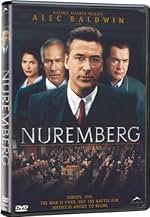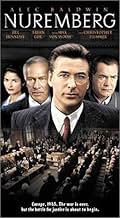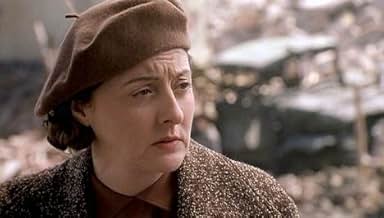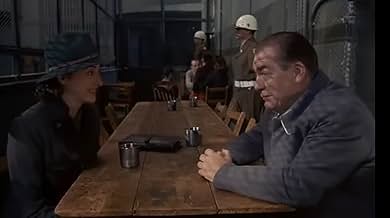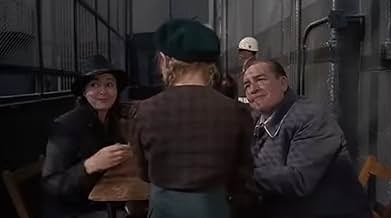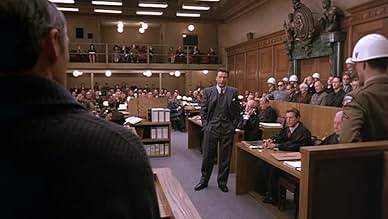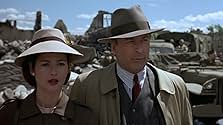अपनी भाषा में प्लॉट जोड़ेंThe dramatized account of the war crime trials following the defeat of Nazi Germany in World War II.The dramatized account of the war crime trials following the defeat of Nazi Germany in World War II.The dramatized account of the war crime trials following the defeat of Nazi Germany in World War II.
- 2 प्राइमटाइम एमी जीते
- 10 जीत और कुल 33 नामांकन
एपिसोड ब्राउज़ करें
फ़ीचर्ड समीक्षाएं
I have read a few books on the Nuremberg trials, as well as books on The Third Reich in general. Though the portrayals of the defendants were fairly accurate, they were not given the appropriate amount of air-time.I mean, without the defendants, there wouldn't have been a trial. Here's the top 10 things that should have been added (and especially subtracted from the movie.)
10) Should have emphasized the alliances between the defendants. Speer wasn't the only one to stand up to Goering. Von Schirach, Funk, and Fritzsche were all against Goering.
9) Give Defendent #2 Rudolf Hess more that four words.
8) Clarifiy why Hess goes crazy at the end.
7) Make sure the audience knows that Speer's penitence could be him saving his hide.
6) Emphasize that Franks conversion was due to him finding God.
5) Talk about the defendants personal lives, try to explain why they would commit these atrocities.
4) Tell what happened to the defendants who were acquitted or had their sentences carried out at Spandau.
3) They should of had the story include Von Schirach and Von Neurath, the youngest and the oldest defendants, so they would have more of a age perspective to the story.
2)All of the Defendants positions should have been named at least once.
1) The Jackson/Secretary affair probably took at'least a half an hour out of the mini-series, Which could have been dedicated to, I don't know, making sure the audience at least knows the defendant's's names. Besides, I don't now one person who saw that movie who actually liked the couple.
10) Should have emphasized the alliances between the defendants. Speer wasn't the only one to stand up to Goering. Von Schirach, Funk, and Fritzsche were all against Goering.
9) Give Defendent #2 Rudolf Hess more that four words.
8) Clarifiy why Hess goes crazy at the end.
7) Make sure the audience knows that Speer's penitence could be him saving his hide.
6) Emphasize that Franks conversion was due to him finding God.
5) Talk about the defendants personal lives, try to explain why they would commit these atrocities.
4) Tell what happened to the defendants who were acquitted or had their sentences carried out at Spandau.
3) They should of had the story include Von Schirach and Von Neurath, the youngest and the oldest defendants, so they would have more of a age perspective to the story.
2)All of the Defendants positions should have been named at least once.
1) The Jackson/Secretary affair probably took at'least a half an hour out of the mini-series, Which could have been dedicated to, I don't know, making sure the audience at least knows the defendant's's names. Besides, I don't now one person who saw that movie who actually liked the couple.
`Nuremburg' is a chilling and disturbing look at the Nuremberg trial of Nazi war criminals after WWII. The story is historically accurate and captures the political and psychological climate of the times. It also serves as a distressing reminder to a young generation that has not experienced war in its lifetime of the horrors of which humanity is capable.
The film examines a number of fascinating angles of the trial. Instead of just focusing on the trial itself (of which there is plenty), it also offers a look at the political rivalry and infighting of the victorious nations, and a number of character studies of the prisoners. The most prominently portrayed of these is Hermann Göring (Brain Cox), Reich Marshall of the Third Reich and a member of Hitler's inner circle. Göring is portrayed as a cunning and charismatic adversary, who almost succeeds at making a sham of the entire trial.
The haunting question that must pervade anyone's mind that ponders the atrocities that occurred in WWII Germany is verbalised in the film by Elsie Douglas (Jill Hennessey). She says, `How could civilised human beings ever do that to other civilised human beings?', to which Justice Jackson (Alec Baldwin) replies, "Maybe civilization is overrated." This film provides some insight into the motivation of the German leaders, examining the warped perspective of the perpetrators who attempt to rationalise the horrors they committed to themselves and to the court. They point to the German sense of duty and obedience that is ingrained into their culture. After all, they were only following orders. There is also the undercurrent of Hitler's ruthlessness in using the SS to eliminate all opposition. In a particularly lucid moment, Göring says that if you look up and down the cellblock all you see is `yes men' because all the `no men' are six feet underground. Göring also points out the hypocrisy of the criticism of German hatred of the Jews by a U.S. society that interred millions of Japanese citizens, and tolerates segregation and hate-crimes against blacks.
Certainly, this is no justification for the systematic annihilation of 10 million of their own citizens, and as the film progresses a number of the prisoners begin to express deep remorse for their actions. Still, it shows that these weren't a group of sociopathic monsters in the conventional sense. They were otherwise normal men who had accomplished the inconceivable by dehumanising their victims to the point where the horrors they committed every day were no more disturbing to them than hunting deer to trim the herd. This is the most frightening thought of all, because it portends the possibility that such unthinkable acts could happen again. As long as we are able to believe that these men were a gaggle of homicidal maniacs, a freak societal aberration, we can reassure ourselves that this couldn't ever recur. However, when it dawns on us that normal people are able to rationalize such behaviour, we realise that under the right circumstances the potential for such inhumanity always exists. Complacency is an inadvertent ally of oppression, and this film should shock even the most casual viewer out of it. In this regard, it is instructive and enlightening.
The direction by Yves Simoneau is excellent and rises well above his mostly TV credits. The mood of the period is realistically rendered with a great deal of period accuracy. The costumes and period props are excellent with an eye for detail. He does an outstanding job creating background reaction shots, especially among the prisoners, that show their sarcastic disdain for their captors and display their smug superiority. He brings great power to numerous scenes using various camera angles. The holocaust footage used is some of the most disconcerting and inclusive I have ever seen. If there is any criticism to be leveled against the crafting of this film, it is that it delved too deeply into minutia, especially the sexual undercurrents between Jackson and Elsie Douglas. However, given the fact that it was produced as a TNT miniseries, the director was forced to fluff it up for the additional runtime.
The acting is also outstanding. Alec Baldwin gives a solid performance as Robert Jackson, a man obsessed with justice. Baldwin has never been known for his passion, but he elevates his game in certain parts of this film. Jill Hennessey is also excellent as Elsie, rendering her as a tough and smart woman who is a guiding force in the entire proceeding. However, by far the best performance is delivered by Brain Cox as Göring. His is a brilliant and complex performance that brings the reprehensible and magnetic Nazi leader to life in a way that is both attractive and loathsome. Colm Feore also gives a spine tingling performance as Rudolf Höss, the Commandant of Auschwitz concentration camp, who cavalierly discusses the efficiency techniques of eliminating prisoners, with the cold precision of an industrial engineer.
This terrific drama rises far above its TV roots. I rated it a 9/10. It is important viewing which reminds us that we cannot become complacent about tyranny, and we must be ever vigilant to guard against its recurrence.
The film examines a number of fascinating angles of the trial. Instead of just focusing on the trial itself (of which there is plenty), it also offers a look at the political rivalry and infighting of the victorious nations, and a number of character studies of the prisoners. The most prominently portrayed of these is Hermann Göring (Brain Cox), Reich Marshall of the Third Reich and a member of Hitler's inner circle. Göring is portrayed as a cunning and charismatic adversary, who almost succeeds at making a sham of the entire trial.
The haunting question that must pervade anyone's mind that ponders the atrocities that occurred in WWII Germany is verbalised in the film by Elsie Douglas (Jill Hennessey). She says, `How could civilised human beings ever do that to other civilised human beings?', to which Justice Jackson (Alec Baldwin) replies, "Maybe civilization is overrated." This film provides some insight into the motivation of the German leaders, examining the warped perspective of the perpetrators who attempt to rationalise the horrors they committed to themselves and to the court. They point to the German sense of duty and obedience that is ingrained into their culture. After all, they were only following orders. There is also the undercurrent of Hitler's ruthlessness in using the SS to eliminate all opposition. In a particularly lucid moment, Göring says that if you look up and down the cellblock all you see is `yes men' because all the `no men' are six feet underground. Göring also points out the hypocrisy of the criticism of German hatred of the Jews by a U.S. society that interred millions of Japanese citizens, and tolerates segregation and hate-crimes against blacks.
Certainly, this is no justification for the systematic annihilation of 10 million of their own citizens, and as the film progresses a number of the prisoners begin to express deep remorse for their actions. Still, it shows that these weren't a group of sociopathic monsters in the conventional sense. They were otherwise normal men who had accomplished the inconceivable by dehumanising their victims to the point where the horrors they committed every day were no more disturbing to them than hunting deer to trim the herd. This is the most frightening thought of all, because it portends the possibility that such unthinkable acts could happen again. As long as we are able to believe that these men were a gaggle of homicidal maniacs, a freak societal aberration, we can reassure ourselves that this couldn't ever recur. However, when it dawns on us that normal people are able to rationalize such behaviour, we realise that under the right circumstances the potential for such inhumanity always exists. Complacency is an inadvertent ally of oppression, and this film should shock even the most casual viewer out of it. In this regard, it is instructive and enlightening.
The direction by Yves Simoneau is excellent and rises well above his mostly TV credits. The mood of the period is realistically rendered with a great deal of period accuracy. The costumes and period props are excellent with an eye for detail. He does an outstanding job creating background reaction shots, especially among the prisoners, that show their sarcastic disdain for their captors and display their smug superiority. He brings great power to numerous scenes using various camera angles. The holocaust footage used is some of the most disconcerting and inclusive I have ever seen. If there is any criticism to be leveled against the crafting of this film, it is that it delved too deeply into minutia, especially the sexual undercurrents between Jackson and Elsie Douglas. However, given the fact that it was produced as a TNT miniseries, the director was forced to fluff it up for the additional runtime.
The acting is also outstanding. Alec Baldwin gives a solid performance as Robert Jackson, a man obsessed with justice. Baldwin has never been known for his passion, but he elevates his game in certain parts of this film. Jill Hennessey is also excellent as Elsie, rendering her as a tough and smart woman who is a guiding force in the entire proceeding. However, by far the best performance is delivered by Brain Cox as Göring. His is a brilliant and complex performance that brings the reprehensible and magnetic Nazi leader to life in a way that is both attractive and loathsome. Colm Feore also gives a spine tingling performance as Rudolf Höss, the Commandant of Auschwitz concentration camp, who cavalierly discusses the efficiency techniques of eliminating prisoners, with the cold precision of an industrial engineer.
This terrific drama rises far above its TV roots. I rated it a 9/10. It is important viewing which reminds us that we cannot become complacent about tyranny, and we must be ever vigilant to guard against its recurrence.
Magnificent film based on actual events with top-notch performances throughout proceeded by a decent star cast and specially by Baldwin , Cox , Plummer , Sydow , Heyerdahl and Len Cariou as supreme judge who presides over the trials , among others . A stimulating portrayal of the Nuremberg trials in which members of the German authorities were brought to response their crimes in the immediate post-war period .
Supreme court Justice , judge Robert H Jackson (Alec Baldwin) is asked to head up the prosecution and he decides to try a representative sample of third Reich leaders , including Hitler's 2º man Hermann Goering (Brian Cox) . The movie initiates with scenes of Núremberg , Germany , 1948 , the destruction of the war is clear everywhere , there Robert is driven through the ruined buildings . The court is formed by three judges to preside the trial against the Nazi chiefs for their complicity in Third Reich . As Robert Jackson in charge of Allied prosecution Nazi war who must resist political pressures and speeches against him , being helped by his assistant Elsie Douglas (Jill Hennessy) . In its opening declaration , the prosecution calls these defendants to account not for violation of due process or other constitutional violations but for killings , tortures , and cruelties committed during WWII . Considers to what extent an individual may be held accountable for actions committed of a superior officer . The accuser statements that the accused cannot claim ignorance that they should have known better for their high position and knowledge . And defenders argue the disobedience to the Fuehrer would have been choice between patriotism and treason for the justices with the subsequent firing squad . Finally the defending councillors explain that not only are the high staff on trial , so are the German people . They claim that the extremists are responsible , not the defendants . They say that very few Germans knew what was going on . Defense lawyers give us the uneasy feeling that the German people never really came to terms with their innocence or guilty . They claimed that the defendants stayed in their positions to keep things from getting worse . One of the more dramatic portions of the film centers around Prosecutor Robert Jackson submitted documents by which the judges and prosecutors had sent thousands to their deaths . A film was shown , a short-documentary is based on real events by means of photographs and stock-footage . As appears work camps are transformed into extermination centers to implement the policy of genocide thought at the Wannsee Conference . At the concentration camps was some minor industrial activity linked to the war effort but the main work was the execution of inmates . Millions of prisoners died in the concentration camps through mistreatment , disease, starvation, and overwork, or were executed as unfit for labor. More than six million Jews died in them, usually in gas chambers, although many were killed in mass shootings and by other means . As the documentary showed a gas chamber at Dachau , but it is a mistake because of it was never used, prisoners died from mistreatment or from execution by means other than gas . The archival footage shows tattooed skin , but Buchenwald prisoners with unusual tattoos were killed , then their skin was preserved for the tattoo collection of convicted war criminal Ilse Koch .
This is a graphic and thought-provoking account of the Nuremberg trials in which a group of high-level hierarchy are on trial , being judged in the immediate post-war period ; and subsequently brought to book by Joseph E. Persico , as this picture is based on his novel titled ¨Núremberg : Infamy on trial¨ . This consuming as well as provoking retelling contains some interesting trial scenes that generally work but there's also the needless byplay of a love story between prosecutor attorney Robert/Baldwin and his secretary/Hennessy . Prosecutor Robert H. Jackson is perfectly played by Alec Baldwin , he gives a very good acting for his impassioned portrayal of the accusation against the nasty Nazis . And also superb : Herbert Knaup as Albert Speer , Christopher Heyerdahl as Ernst Kaltenbrunner , Colm Feore as Rudolf Höß , Fournier as Reichsminister Alfred Rosenberg , Cloutier as admiral Karl Dönitz , Frank Moore as Hans Frank , René Gagnon as Reichsminister Arthur Seyß-Inquart , Benoît Girard as Joachim Von Ribbentrop , Dennis St John as Franz Von Papen , LaFortune as Rudolf Hess , Sam Stone as Julius Streicher and , of course , the always chilling Brian Cox . This deeply moving and powerful film was well -but not overly compelling- directed by Yves Simoneau . Rating : Good , better than average .
Supreme court Justice , judge Robert H Jackson (Alec Baldwin) is asked to head up the prosecution and he decides to try a representative sample of third Reich leaders , including Hitler's 2º man Hermann Goering (Brian Cox) . The movie initiates with scenes of Núremberg , Germany , 1948 , the destruction of the war is clear everywhere , there Robert is driven through the ruined buildings . The court is formed by three judges to preside the trial against the Nazi chiefs for their complicity in Third Reich . As Robert Jackson in charge of Allied prosecution Nazi war who must resist political pressures and speeches against him , being helped by his assistant Elsie Douglas (Jill Hennessy) . In its opening declaration , the prosecution calls these defendants to account not for violation of due process or other constitutional violations but for killings , tortures , and cruelties committed during WWII . Considers to what extent an individual may be held accountable for actions committed of a superior officer . The accuser statements that the accused cannot claim ignorance that they should have known better for their high position and knowledge . And defenders argue the disobedience to the Fuehrer would have been choice between patriotism and treason for the justices with the subsequent firing squad . Finally the defending councillors explain that not only are the high staff on trial , so are the German people . They claim that the extremists are responsible , not the defendants . They say that very few Germans knew what was going on . Defense lawyers give us the uneasy feeling that the German people never really came to terms with their innocence or guilty . They claimed that the defendants stayed in their positions to keep things from getting worse . One of the more dramatic portions of the film centers around Prosecutor Robert Jackson submitted documents by which the judges and prosecutors had sent thousands to their deaths . A film was shown , a short-documentary is based on real events by means of photographs and stock-footage . As appears work camps are transformed into extermination centers to implement the policy of genocide thought at the Wannsee Conference . At the concentration camps was some minor industrial activity linked to the war effort but the main work was the execution of inmates . Millions of prisoners died in the concentration camps through mistreatment , disease, starvation, and overwork, or were executed as unfit for labor. More than six million Jews died in them, usually in gas chambers, although many were killed in mass shootings and by other means . As the documentary showed a gas chamber at Dachau , but it is a mistake because of it was never used, prisoners died from mistreatment or from execution by means other than gas . The archival footage shows tattooed skin , but Buchenwald prisoners with unusual tattoos were killed , then their skin was preserved for the tattoo collection of convicted war criminal Ilse Koch .
This is a graphic and thought-provoking account of the Nuremberg trials in which a group of high-level hierarchy are on trial , being judged in the immediate post-war period ; and subsequently brought to book by Joseph E. Persico , as this picture is based on his novel titled ¨Núremberg : Infamy on trial¨ . This consuming as well as provoking retelling contains some interesting trial scenes that generally work but there's also the needless byplay of a love story between prosecutor attorney Robert/Baldwin and his secretary/Hennessy . Prosecutor Robert H. Jackson is perfectly played by Alec Baldwin , he gives a very good acting for his impassioned portrayal of the accusation against the nasty Nazis . And also superb : Herbert Knaup as Albert Speer , Christopher Heyerdahl as Ernst Kaltenbrunner , Colm Feore as Rudolf Höß , Fournier as Reichsminister Alfred Rosenberg , Cloutier as admiral Karl Dönitz , Frank Moore as Hans Frank , René Gagnon as Reichsminister Arthur Seyß-Inquart , Benoît Girard as Joachim Von Ribbentrop , Dennis St John as Franz Von Papen , LaFortune as Rudolf Hess , Sam Stone as Julius Streicher and , of course , the always chilling Brian Cox . This deeply moving and powerful film was well -but not overly compelling- directed by Yves Simoneau . Rating : Good , better than average .
Brian Cox picks this mini-series up by the scruff of the neck and runs off with it. It is an amazing testimonial to his talent and his craft that he suceeds in making Field Marshall Hermann Goerring the most appealing and charming character in this rehash of the Nuremburg trials. His "seduction" of the young American non-com is not only plausible but gratifying. It is amazing that this performance has one cheering on the second in command of the Third Reich as he cheats the hangman's noose.
This is a strange subject for a modern TV series designed to entice an audience to whom World War II is as distant as the Pelopenesian Wars. Yet this is a tough, well produced, historically accurate and thoroughly compelling film. Brian Cox steals the show with a masterful recreation of Hermann Goering as a beguiling rogue. And the production techniques excel, for example the sound track as silent film of the concentration camps is shown to the trial. It puts the horror in context without exploiting it or sensationalizing it. A brilliant piece of historical film making.
क्या आपको पता है
- गूफ़At the end of the trial, Field Marshall Wilhelm Keitel is referred to as "Admiral Keitel."
- भाव
Reichsmarschall Hermann Wilhelm Göring: One German, a fine man. Two Germans, a bund. Three Germans, a war. One Englishman, an idiot. Two Englishmen, a club. Three Englishmen, an Empire.
- कनेक्शनFeatured in The 58th Annual Golden Globe Awards 2001 (2001)
- साउंडट्रैकDeep in the Heart of Texas
Written by June Hershey and Don Swander
Performed by cast
Melody Lane Music c/o Peermusic International
टॉप पसंद
रेटिंग देने के लिए साइन-इन करें और वैयक्तिकृत सुझावों के लिए वॉचलिस्ट करें
- How many seasons does Nuremberg have?Alexa द्वारा संचालित
विवरण
- रिलीज़ की तारीख़
- कंट्री ऑफ़ ओरिजिन
- आधिकारिक साइट
- भाषाएं
- इस रूप में भी जाना जाता है
- Nuremberg
- फ़िल्माने की जगहें
- उत्पादन कंपनियां
- IMDbPro पर और कंपनी क्रेडिट देखें
- चलने की अवधि
- 1 घं 30 मि(90 min)
- रंग
- ध्वनि मिश्रण
- पक्ष अनुपात
- 1.85 : 1
इस पेज में योगदान दें
किसी बदलाव का सुझाव दें या अनुपलब्ध कॉन्टेंट जोड़ें



